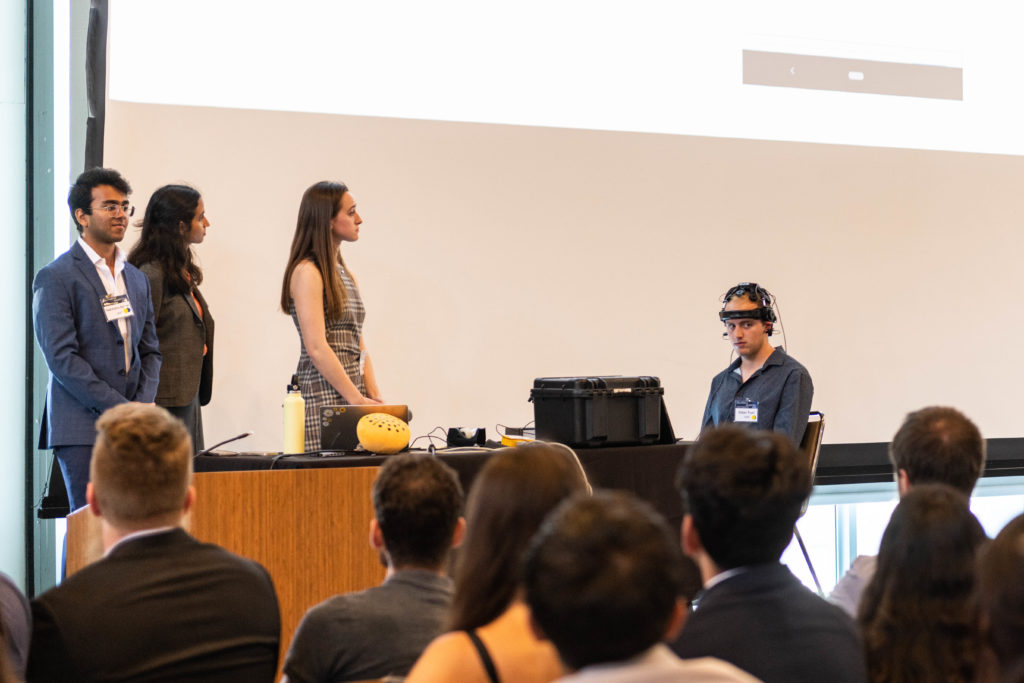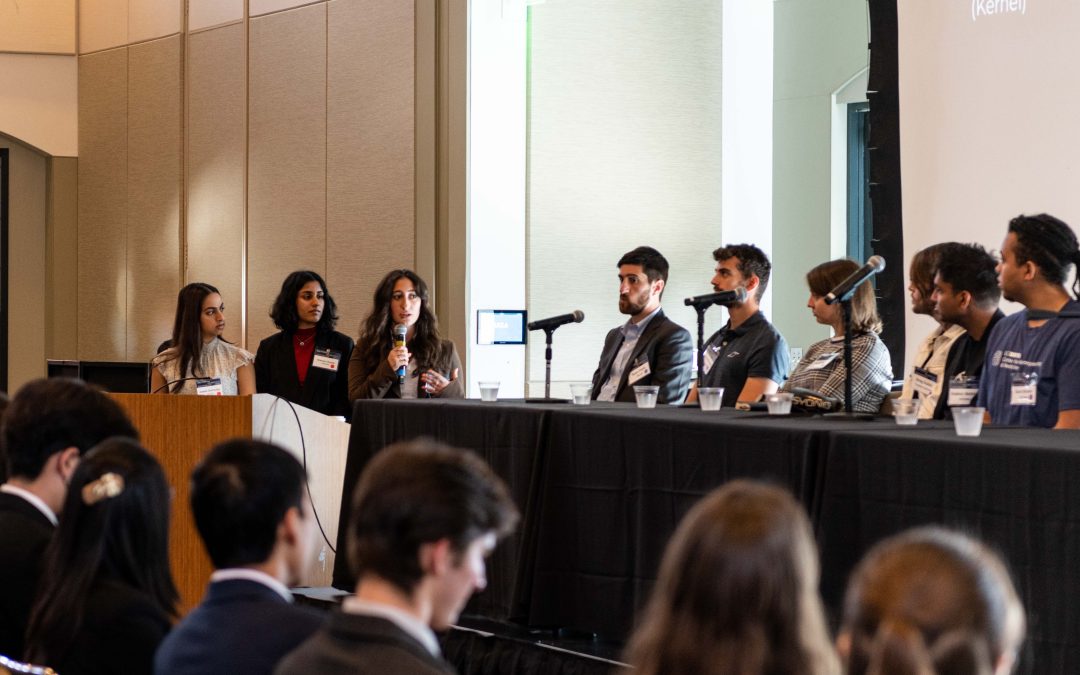This post was updated May 9 at 11:55 p.m.
CruX UCLA hosted the inaugural California Neurotechnology Conference on April 29, featuring professionals and student clubs across the UC system.
Dozens of researchers, industry representatives and student group members gathered in Covel Commons for the conference, where they participated in panels and competitions and gave speeches to discuss both neurotechnology’s benefits and ethical concerns in diagnosing and treating neurodegenerative and mental health disorders.
The motivation behind the conference was to create a space to showcase advances in the field and student projects and foster interactions between academia and industry, said Soulaimane Bentaleb, president of CruX UCLA, a student-led organization that aims to help students develop skills and form connections relevant to neurotechnology. The conference began with the first plenary speaker, followed by an industry panel, a student competition and poster session, and a second plenary speaker, with a final keynote speaker to conclude.
“We really wanted to emphasize the importance of networking, connections (and) getting to meet people that you would never get to meet otherwise,” said Bentaleb, who is also a fourth-year bioengineering student.
Leou Ying, a CruX UCLA project team lead and third-year neuroscience student who presented a poster about focus on smart technology, said the conference was a unique opportunity because students interested in neurotechnology typically do not have many opportunities to engage with industry professionals and peers passionate about the field.
“It (neurotechnology) is going to be very powerful,” Ying said. “So it’s very important for young people like us … to have these kinds of conversations about this very powerful technology.”
Anne Andrews, plenary speaker and professor of psychiatry, opened the conference with a presentation on her research into technology to monitor neurotransmitters – chemicals that carry signals between neurons. Scientists have hypothesized that there are many neurotransmitters involved in neuropsychiatric disorders such as depression and neurodegenerative diseases such as Parkinson’s.
Andrews said such measurements could help researchers understand how neurotransmitter levels are affected by the disease and inform future treatments, adding that there are currently no devices widely available for this purpose.
Following Andrews’ presentation, a panel of nine industry professionals in neurotechnology – from UCLA and UC Davis as well as companies such as Medtronic, PSYONIC and PsyMed Ventures – shared their experiences in and their vision for the field of neurotechnology. During a section of the panel focused on revolutionizing the health care industry, William Speier, an associate professor in the department of radiological sciences and panelist, said neurotechnology could change the lives of the patients he works with who have amyotrophic lateral sclerosis, a neurodegenerative disease in which nerve cells in the brain and spine deteriorate over time.
“In the later stages of the disease, they have no way of interacting with their environments,” Speier said. “Neurotechnology is really the only way of restoring any type of ability to communicate to devices or really have any type of autonomy.”
Greg Kubin, a partner at Psymed Ventures, a venture capital group focused on investing in mental health technology, also discussed the impact of neurotechnology on mental health disorder diagnosis in the panel.
Kubin said neurotechnology could revolutionize clinicians’ approach to mental health disorders.
“I’m really interested in how neurotechnology can remove the guesswork around diagnosis and treatment options,” Kubin said. “I would love to live in a world where you can actually have … brain scans (for mental health diagnosis).”
A student Brain Computer Interface competition, which centered on student devices using an individual’s brain waves to interact with technology, followed the panel with student clubs from UCLA, UC Berkeley, UC San Diego and UC Davis presenting their device designs to a panel of industry professionals and professors.

The winning device by CruX UCLA uses an electroencephalogram – a recording of electrical activity in the brain – to allow users to operate a computer using only their neural signals. The device identifies which square the user connected to the EEG headset is looking at on a grid shown on the screen and can execute functions accordingly.
The plenary speaker Karen Moxon, a professor of biomedical engineering at UC Davis, studies how encoded sensory information enables human motor functions to be processed in the brain. Understanding how the brain encodes postural control is essential to working toward a better treatment of spinal cord injuries and other neurological disorders, Moxon said. In the case of strokes, for example, the brain is injured and cannot properly perform contractions related to the flexing and extending of limbs. A better understanding of such complications can help in being able to restore these functions, she added.
Vikash Gilja, an associate professor of electrical and computer engineering at UC San Diego and the last speaker at the conference, discussed the clinical applications of brain machine interfaces and harnessing the power of brainwave controlled tools for patients with neurodegenerative diseases. Gilja’s lab has worked on algorithms for vocalization prostheses that can decode brain activity and transform it into speech.
Bentaleb said the conference, which will be held annually, originated from an idea from their board meeting. He added that it was only possible through collaboration between the neurotechnology clubs of UCLA, UC Berkeley, UCSD, UCSC and UC Davis’ campuses. As the conference was student-run, Ying said there were valuable interactions between students and professionals in the field through which both parties could learn from each other.
Gilja said as new connections are formed between academia and the industry, the field of neurotechnology will continue to advance.
“As the science matures, as the technology matures, as there’s an academic industry partnership happening, and as these tools get out there, we can start to grow our abilities and the field keeps progressing,” Gilja said.

